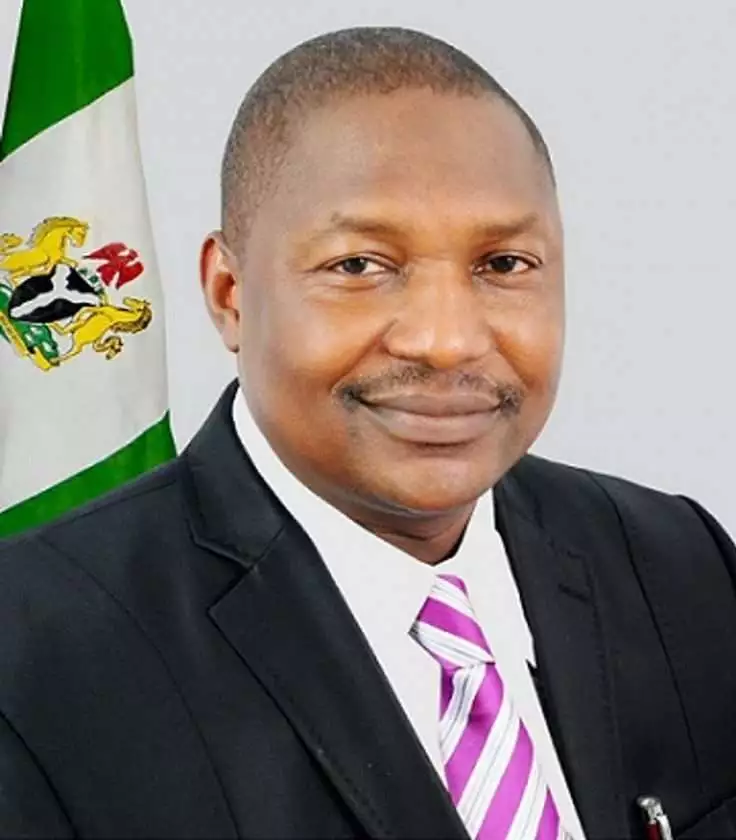Abubakar Malami, the Attorney General of the Federation and Minister of Justice has faulted 36 state governors in the country for dragging the Federal Government to court over the $700 million recovered loot.
The Buhari government has received several millions of dollars from Europe and other countries in late dictator General Sanni Abacha loots. The governors are now demanding accountability of the funds.
The governors have filed a suit at the Supreme Court against the Federal Government on the status of recovered funds and failure to remit same to the federation account.
In the suit, the plaintiffs are seeking a declaration by the provisions of 162 (1) and Section 162(10) of the Constitution of the Federal Republic of Nigeria 1999 (as amended), all income, returns, proceeds, or receipts derived from confiscated, forfeited and/or recovered assets constitute revenue must be remitted to the Federation account for the collective benefit of the Federal, State and Local Governments.
Amongst other things, they are also seeking a declaration that the failure and/or refusal of President Muhammadu Buhari, the Minister of Finance, the office of the AGF, and the Accountant-General of the Federation, and all her relevant authorities and/or agencies of the Federation to remit the receipts, income, returns or proceeds derived from all assets recovered, seized, confiscated and forfeited into the Federation account to be distributed in accordance with the provisions of the Constitution is unconstitutional.
They also asked the court to declare that “it is unconstitutional for the President, through the Federal Minister of Finance, the AGF, or any other authority whatsoever, to utilise, apply, allocate, expend and appropriate same to itself or distribute same in any other manner howsoever without due allocation from the Federation.”
Reacting, Malami in a statement signed by his media aide, Umar Gwandu, argued that international recoveries are not subjected to local laws, because several sovereignties are involved.
The statement said, “International recoveries are more or less governed by international conventions, negotiations, and agreement of parties. It is never a straightjacket application of local legislation.
“Revenue Mobilization and Fiscal Commission Act has nothing specific on funds recovered from indicted public officers. It merely mentions accruals and disbursement of revenue from the Federation Account. So questions of recovery of stolen funds from indicted public officers are appropriately dealt with by other relevant laws.
‘It is, therefore, misleading to give the impression that such recoveries and usage of stolen funds and stashed abroad are provided for by the Revenue Mobilization, Allocation and Fiscal Commission Act.
“One cannot situate rights and entitlements on looted funds and recovered assets with myopic and narrow understating of concepts of the application of local legislations. For the avoidance of doubt and the purpose of setting the record straight, the application of the looted funds can only be factored within the context of mutual understanding and negotiations of international and multifaceted jurisdictional and territorial legislative issues.
“The recovery of stolen assets and the subsequent uses to which these funds may be employed are subject to international agreements between Nigeria and the affected countries, thereby bringing the conflict of laws into contemplation.”
The statement added that, “Importantly also, these repatriated funds are based on cooperation and mutual assistance agreements, especially the United Nations Convention against Corruption and Implementation of the Global Forum on Asset Recovery (GFAR) Principles on the Repatriation of Stolen Assets. The African Union and the ECOWAS Protocols on recovery of illicit funds are equally relevant when it comes to the role of Nigeria in relation to its other partners.
“As a member of the committee of nations and a respectable international partner, Nigeria must always strive to fulfill its international commitments in the repatriation and use of stolen funds and assets.
“By way of example, the Federal Government of Nigeria has entered into numerous agreements such as the one with the United States and the Island of Jersey in 2020 and including with other countries around the world. Where the agreements assume an international character, the specifics of the agreement often dictate the trajectory of recovery, sharing, transfer, and implementation.
“Some element misunderstood the issue of international recoveries and locally generated funds in relation to monies belonging to the Federal Government that are locally generated. It is not to be confused with stolen funds and assets domiciled in foreign jurisdictions whose recovery and subsequent repatriation are based on international legal arrangements between the Federal Republic of Nigeria and the foreign custodians of these funds.
“It needs to be further noted that even recoveries of local assets are in most cases regulated by the applicable legislation and judicial pronouncements associated with this legislation and not Revenue Mobilization and Fiscal Commission Act exclusively. One can cite for the purpose of clarity recoveries done by the NDLEA, EFCC, ICPC among others,” Malami said.
Discover more from The Source
Subscribe to get the latest posts sent to your email.








